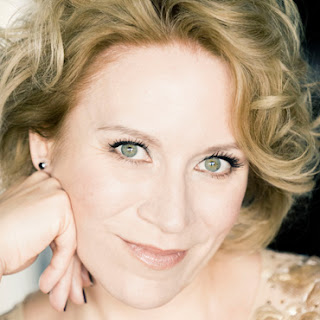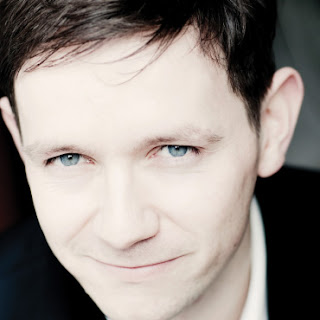 |
| Carolyn Sampson (photo Marco Borgreve) |
Reviewed by Robert Hugill on 2 June 2018 Star rating: (★★★★)
A programme of duets highlighting beauty of tone and fine artistry
Soprano Carolyn Sampson, counter-tenor Iestyn Davies and pianist Joseph Middleton released a disc of duets last year on the BIS label, and on Saturday 2 June 2018, they brought a programme of songs and duets to the Wigmore Hall, featuring many of the items on the disc.
The evening opened and closed with English song, first Britten's realisations of Purcell, and the songs and duets by Roger Quilter to close. In the middle, we heard duets written by Felix Mendelssohn and Robert Schumann, a chance to hear repertoire which does not always feature in the concert hall.
 |
| Iestyn Davies (photo Marco Borgreve) |
Whatever I thought of the music, there was no doubting the beauty of the performances with Carolyn Sampson and Iestyn Davies providing a finely balanced pairing which seemed to make them ideal for these modern re-interpretations of Purcell; both singers with great period experience as well as more recent repertoire. And Joseph Middleton played Britten's creative piano parts with real love. We heard the duets Sound the trumpet, Lost is my quiet and No, resistance is but vain along with two solo songs If music be the food of love from Sampson and Music for a while from Davies.
The centre-piece of the programme, spanning the interval, was a sequence of songs and duets by Felix Mendelssohn and Robert Schumann demonstrating the way these two incorporated the duet form into their lieder output. What was noticeable about the duets from both composers was how the two rarely moved away from the format of two voices moving together (homophonically) over a rippling piano accompaniment. Beautiful as these songs were, you sometimes longed for a more imaginative texture and I did wonder whether the need for the music to be accessible to and popular with the printed music buying amateur was a factor in this.
We heard Mendelssohn's duets Ich wollt', meine Lieb' ergosse sich and Volkslied from his opus 63 duets, and the Drei Lieder fur zwei Singstimmen Op. 77, plus two solo songs. Carolyn Sampson sang Neue Liebe with its delightful evocation of the fairies, and a sting in the tail, whilst Iestyn Davies sang Scheidend with a beautifully floated line over an undulating piano.
Turnng to Schumann we heard his Drei zweistimmige Lieder Op. 43 and So wahr die Sonne scheinet Op.37 No. 12. The opus 43 duets date from 1840, Schumann's liederjahr but the writing in them is often closer to Mendelssohn than we might expect with a great deal of lyric beauty and only hints of darkness, whilst the opus 37 duet (which dates from 1841) was remarkably hymn like. Again we heard a pair of solo songs, Carolyn Sampson gave a light and delightful account of Auftrage Op.77 No. 5 whilst Iestyn Davies was quietly intense in Nachtlied Op.96 No. 1.
Finally, we turned to the songs and duets of Roger Quilter. The set opened with the delightful duet It was a lover and his lass Op.23 No.3, where Quilter's imaginative (non-homophonic) writing for two voices really charmed. A trio of solo songs came next, Carolyn Sampson sang the rightly popular Drink to me only with thine eyes and Love's philosophy, whilst Davies sang Music, when soft voices die. The songs veered towards the salon at times, but are lovely of their type and both singers and pianist performed them with fine seriousness of purpose. We finished with another duet, this time setting words by the composer Richard Rodney Bennett's father, Love calls through the summer night. Again this veered towards the salon, particularly in the waltz sections, but the results were a complete delight and it was perhaps the hit of the evening.
This was a programme which allowed the two singers to demonstrate their fine artistry and beautifully balanced tone, giving us some perfectly realised duets accompanied by Joseph Middleton's poised accompaniments. If I sometimes wished some slightly meatier fare in the programme, I could at least sit back and admire the sheer musicality of the performances.
We were treated to two encores, Roger Quilter's Weep you no more sad fountains and Mendelssohn's Mai Glockchen.
Elsewhere on this blog:
- Liam Scarlett's new production of Swan Lake at the Royal Ballet - ballet review
- 90th birthday celebration: my interview with composer Thea Musgrave - interview
- Comedy & pathos: Mozart's Cosi fan tutte at Opera Holland Park (★★★★) - Opera review
- Elegie: Rachmaninoff, a heart in exile, Lucy Parham & Henry Goodman (★★★★) - Cd review
- Sparkling opener: Verdi's La traviata at Opera Holland Park (★★★★½) - Opera review
- The Dark Lord's music (★★★½) - CD review
- Worth seeking out: Verdi's La Traviata from Hampstead Garden Opera - (★★★½) opera review
- George Benjamin & Martin Crimp's Lessons in Love and Violence (★★★★½) - Opera review
- A heart in exile: pianist Lucy Parham talks about her latest composer portrait - interview
- Prophetiae Sibyllarum: Gallicantus (★★★★) - CD review
- Interesting programmes, strange timing - homages to Lully and Louis Couperin at London Festival of Baroque music (★★★★ / ★★★½) - concert review
- Musical style is like a language: I chat to German composer Moritz Eggert - Interview
- Alan Rawsthorne - a portrait: Chamber music and woodwind concertos (★★★) - CD review
- Unashamedly Romantic: Reynaldo Hahn chamber music from James Baillieu and friends (★★★★½) - CD review
- Transcendent mysticism: Vaughan Williams' Mass from St John's College (★★★★★) - CD review
- Te Deum: Purcell & Charpentier at Westminster Abbey for London Festival of Baroque Music (★★★★) - Concert review
- All-star Orfeo - Iestyn Davies and Sophie Bevan at the London Festival of Baroque Music (★★★★) - Concert review
- Home



.jpg)






%20Craig%20Fuller.jpg)
No comments:
Post a Comment